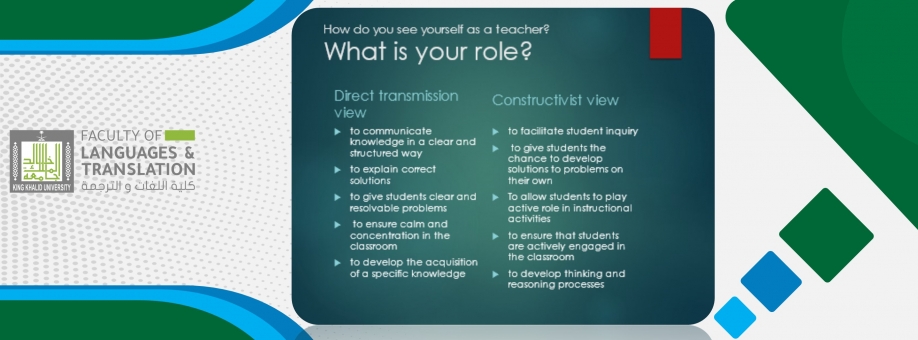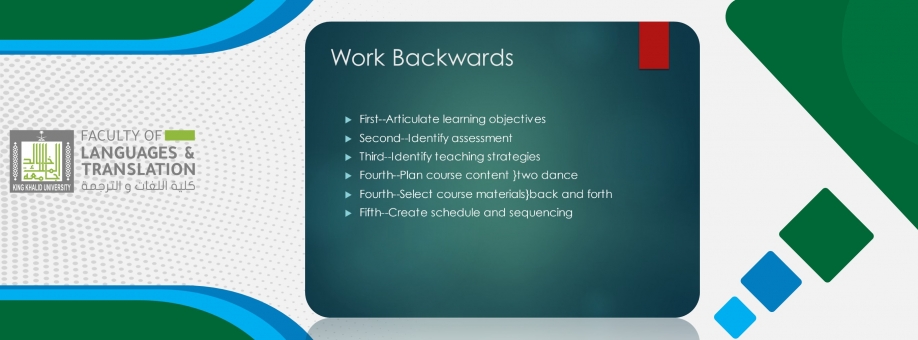On 31 March 2021, Hassan Costello and Dr. Sayyed Rashid Ali Shah delivered an in-service teacher training webinar to 145 participants. The webinar, in cooperation with the Ministry of Education in Asir and Rijal Alma on "IELTS Listening and Speaking" by Hassan Costello and "IELTS Preparation: Reading & Writing!" by Dr. Sayyed Rashid Ali Shah, provided both male and female teachers with exam-specific tips and how to answer different question types.
After introductions by Vice Dean for Academic Development & Quality, Dr. Abdulrahman Almosa, Costello began the webinar by reviewing the content of the IELTS Listening Test, and then he moved on to provide a lot of useful tips. He explained that the IELTS Listening Test is not only about listening to the recording but also about understanding the content and finding answers at the same time. "When you have your test, you need to listen to the recording, read the questions, and at the same time write down your answers. At one time, you are listening, reading, and writing. You really are multitasking during this listening test. It can be quite difficult, and it's something that you do need to practice." He then explained that concentration is the biggest challenge for test-takers. He noted that test-takers really need to concentrate during the IELTS Listening test because if focus is lost at any time, test-takers will miss an answer and lose their place in the recording. He then moved on to discuss how test-takers can do well on the 3 parts of the IELTS Speaking Test. He encouraged test takers to avoid yes or no responses in part 1 and expand their answers through examples. "The speaking task has three different parts to it: part one, part two, and part three. In part two, candidates are expected to speak for about two minutes, and there is no interruption. In part 3, it's more like an interview. If the examiner asks you some sort of question, you respond and they ask you another question, or they might ask you to go deeper into the first question. Sometimes they'll ask you to predict something, you might compare, and they might ask you to give your opinion. Remember that part 3 is based on a theme. In part 2 you're given something to describe and it might be a historical building, it might be a teacher you really liked, it might be an object precious to you. Part 3 continues from part 2, so whatever you talked about in part 2 you're going to talk about in part 3 but at a more abstract level." Towards the end of his part of the webinar, Costello advised potential test-takers not to worry about accents or about mistakes. "It's okay if you have an accent in terms of your pronunciation mark. The main thing they're looking for is that you speak clearly and they can understand what you're saying. Don't worry if you make mistakes. Treat this almost like a conversation."
Dr. Shah then began by noting a lot of the strategies covered on the IELTS Listening Test are applicable to the IELTS Reading Test, and he will provide 10 reading strategies and 6 writing strategies that candidates often need to remember. "I'll try to share my personal experience with you because I went through these different stages in my academic life. I took IELTS as a student, and more than twice I moved on, and at the end, I reached the target of becoming an IELTS examiner," he said. Dr. Shah then highlighted that there are 11-14 various types of questions, explaining that awareness of the types of questions along with identifying the types of questions will help candidates to score well. Dr. Shah then emphasized the importance of skimming and scanning long passages. He related that it would be difficult to answer all 40 questions without efficient skimming and scanning techniques. "Candidates are usually not very much familiar with the types of texts included in the IELTS academic module or general training. Reading articles online will help to widen reading skills and develop familiarity with complex texts and passages," he said. Towards the end of his part of the webinar, Dr. Shah highlighted Task 2 of IELTS Academic Writing, explaining that techniques can be applied to writing a letter in the general training module or to describe a graph or pie chart, which is Task 1 in IELTS Academic Writing. After, he explained that the IELTS Writing rubric evaluates four different aspects of your responses: Coherence and Cohesion, Lexical Resource, Grammatical Range and Accuracy, and Task Response. Dr. Shah then provided examples of each of the 4 aspects, noting that they should not be ignored. "It is important that you understand the question. Understanding questions solves half of the problem," he said.
The Bachelor of Arts in English program at the Faculty of Languages and Translation is committed to participating in community partnership activities as part of its role in the community partnership plan at King Khalid University.
Date: 4/7/2021
Source: Faculty of Languages and Translation


